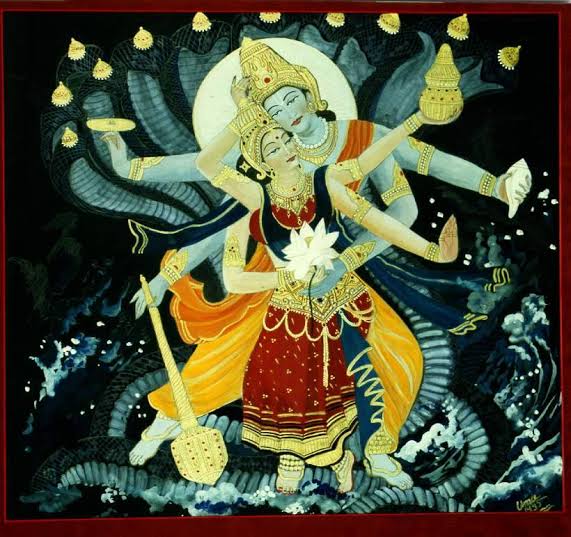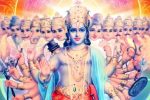NAME 79
Kramaḥ क्रमः
Kramah – He maintains order in the Universe
According to Panini Sutra, which reads “Vrtti-Sarga-Tayaneshu Kramah”, Krama indicates continuity, energy, or good progress or development. He who is All-Pervading is Kramah. Because of His All-Pervasiveness, the Infinite is called as Vishnu. That which goes beyond the frontiers of the known is the Supreme, and, therefore, in the description of Him, who has manifested as the Cosmos, we have in Purushasukta an indication that He not only pervades all that is known but “extends even beyond by ten digits” (Atyatishthat Dasangulam).
Kramah Who takes different avataras successively
Vishnu is called Kramah, because He is the cause of Kramana or crossing of the ocean of samsara by devotees, or because from Him all Krama or manifestation of the universe, has taken place.
Krama is one of the systems followed by Kashmiri scholars, where inner purification takes place in successive stages from obscurity to perfect clarity leading to realisation of the Brahman. Perfect clarity can be attained only through knowledge, as discussed in nāma 77. He can be realised only by attaining perfect mental clarity.
This Nama has 3 possible meanings.
a) One who is the basis for the order in the Universe
b) One who controls and bestows the power of movement
c) One who is highly prosperous.
Krama means order so He brings order to the chaotic Universe. Krama also means movement hence the meaning applies to Motion.
According to Panini Sutra 1.3.38, which reads “vrtti-sarga-taayaneshu kramah”, krama also can indicate continuity, energy, or good progress or development. Sri Bhattar uses the last of these, and gives the meaning “One who has great prosperity”.
७९. ॐ क्रमाय नमः |
79. OM Kramāya Namaḥ
Kramah -He who is All-Pervading is Kramah. Because of His All-Pervasiveness, the Infinite is called as Vishnu. That which goes beyond the frontiers of the known is the Supreme, and, therefore, in the description of Him, who has manifested as the Cosmos, we have in Purushasookta an indication that He not only pervades all that is known but “extends even beyond by ten digits” (Atyatishthat Dasaangulam).
Krāmati / क्रामति He walks or is the cause of walking (progressing). Or vide Manu Smr̥ti (12.121) Krāṃte Viṣṇum / क्रांते विष्णुम् In the matter of walking, Viṣṇu.
INTERPRETATION GUIDED BY SANT VANI (WORDS OF SAINTS)
Kramaḥ
The cause of movement.
He who ‘moves’ and is the cause of all motion (at the level of the macrocosm and the microcosm). He, who is the “vehicle” to cross the ocean of Samsāra (Śaṅkara). He who puts all things in order. He who is prosperous by virtue of being the master of eternal and transcendental glory (Parāsara Battar).
Lord Viṣṇu is the adhiṣṭhāna-devatā for the feet and hence movement. Thus He is the cause of movement and He is also the motion. Hence He is known as Krama. Again, being caitanya, consciousness which makes movement possible, He is the cause of movement. Every step we take is because of that capacity for the legs to walk, given by Lord Viṣhṇu.
Krama means order. He alone is in the form of krama, order that makes the movement of this world possible. In everything in the creation, there is a basic order and there is a sequence also. Every sequence is krama. There is a sequence of cause and effect, action and reaction and so on.
There is a sequence in the subtlety of the five elements–ākāśa, vāyu, āgni, āpaḥ and prthivī. That each of them is subtler than the next is a krama. Even in cooking there is krama, order. In a ritual, there is krama, as to what has to be done first and what has to be done next and so on. Thus, there is an order. So the Lord is Krama, in the form of order.
This is one of those names that is difficult to interpret. If it was only movement that is talked about, then that is covered by other names. If it is about crossing the Ocean of Samsāra then one could argue that, that too is covered by the previous name Vikramaḥ where even the way is pointed to us in the form of that great bird of soaring consciousness – Garuḍa. I find Parāsara Battar’s interpretation to be a jarring note in a string where one name dovetails with the other and this name seems to be out of ‘sync’ with the names in this string. This interpretation (prosperous) may well be in-line with the rules of grammar – but isn’t the Supreme being beyond all rules? Further, if our premise is that each name must have a meaning contextually or in conjunction with another name or even independently, then we must look for possible meanings outside these two interpretations that are given by the two great commentators.
One of the meanings of the word Krama is also ‘order’ and “structure” (besides progress and forward motion) and progress (movement) to be worthwhile needs to be ordered and structured. Most people dissipate energy in being “busy” but do not really know what it means to ‘act’. To “act” necessarily means to be in flow. Most things we observe in nature (that have not been tampered with, by human intervention) are in a rhythmic and natural flow – it is only humans who seem to have lost this connection and don’t know how to act. To hurry has come to symbolize most of us and our actions. Even when we are ‘silent’ we not really “SILENT” The chatter of the entire Universe is in our head – our limbs are as disoriented as our thoughts.
Most often, our mind races ahead of us such that ‘our mind’ is working on something else even as WE are working on something entirely different. A speeding mind invariably has an effect on the physical as well and in all that we do. The Krama, orderly flow that should be life then becomes Akrama – disjointed, disorderly, and out of flow. Slowing down does not translate into lethargy – it essentially means to gain mastery over the Manas, the mind such that it works for you and with you and does not constantly race ahead of you – when every task that you do and everything you do is in the full light of the purpose and its significance with mindfulness – when you can sift the wheat from the chaff…
No amount of doing is going to get you to BEING. When Hurry is replaced by the order of Hari the Krama establishes itself.
This Viveka (discernment) is what Viṣhnu provides and when he becomes the guiding principle, the inner controller, then Krama i.e. orderly flow becomes second nature and life itself flows naturally and unperturbed.
As Bhagavan says in the Bhagavad-gītā:
किं कर्म किमकर्मेति कवयोऽप्यत्र मोहिता: |
तत्ते कर्म प्रवक्ष्यामि यज्ज्ञात्वा मोक्ष्यसेऽशुभात् || 16||
kiṁ karma kim akarmeti kavayo ’pyatra mohitāḥ
tat te karma pravakṣhyāmi yaj jñātvā mokṣhyase ’śhubhāt
What does it mean to act and what is inaction? (kiṁ karma kim akarmeti) Even those who appear to be wise (or we think are wise) seem to find this difficult and confusing to comprehend and determine. I shall tell you the secret of work (the way it has to be done) and the Viveka (discernment) to differentiate between the two (action and inaction). This should help liberate (mokṣhyase) you…
and then provides the answer
कर्मण्यकर्म य: पश्येदकर्मणि च कर्म य: |
स बुद्धिमान्मनुष्येषु स युक्त: कृत्स्नकर्मकृत् || 18||
karmaṇyakarma yaḥ paśhyed akarmaṇi cha karma yaḥ
sa buddhimān manuṣhyeṣhu sa yuktaḥ kṛitsna-karma-kṛit
Those who are able to see action in inaction and inaction in action they are truly wise – This essentially means that the wise know how to carefully choose where they need to focus their attention and energy. They never fritter away their time in wasteful work.
A passage below from “The House of the Lord” which gives a glimpse into Sri Aurobindo‘s time spent in convalescence after he had fractured his leg – rhythm, steadiness, and silence were the music of his life Every small or simple act was measured and steady, filled with an immeasurable calmness. The passage below captures his mindful mood while eating…
——-Quote
Steadiness and silence were the characteristic stamps of Sri Aurobindo. Dhira, according to him, was the ideal of Aryan culture. Hurry and hustle were words not found in his dictionary. Be it eating, drinking, walking or talking – he did it always in a slow and measured rhythm, giving the impression that every movement was conscious and consecrated. The Mother would punctuate the silence with queries like, “How do you like that dish?” or such remarks as, “This mushroom is grown here, this is special brinjal sent from Benares, this is butterfruit.” To all, Sri Aurobindo’s reply would be, “Oh, I see! Quite good!” Typically English in manner and tone! His silence or laconic praise made us wonder if he had not lost all distinction in taste! Did rasagolla, bread and brinjal have the same taste in the Divine sense-experience? Making this vital point clear, he wrote in a letter: “Distinction is never lost, bread cannot be as tasty as a luchi, but a yogi can enjoy bread with as much rasa as a luchi – which is quite a different thing.”
—–Unquote
“Sparrows come when the sun is out, they hunt for food and fly back to their nest in the evening. Quite similarly, soul finds a womb when the time is right, lives a life and goes back to merge in the Supreme Consciousness. Or, it is reborn to fulfill its desires like the hungry bird that continues flying in search of food. This is the cycle of samsara. This is the mystical play of nature. Transient but eternal. Sophisticated yet simple.”
“At any rate, it is a blessing. Like our lives, like our planet. Beautiful.“
– Om Swami



